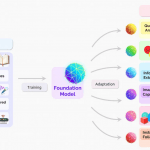Artificial Intelligence (AI) has been a buzzword in recent years, and many have expressed concerns about its potential to replace jobs. However, a closer examination reveals that AI is not a job threat but rather a catalyst for professional evolution. In this article, we will explore five key reasons why AI should be viewed as an opportunity for growth and transformation rather … [Read more...] about Why AI is Not a Job Threat, but a Catalyst for Professional Evolution
Artificial Intelligence
Learn about the latest developments in artificial intelligence and how it is transforming industries around the world. Our website offers insights and resources for understanding AI and its applications.
Generative AI: Security Risks and Strategic Opportunities
As everyone is aware, artificial intelligence is becoming more powerful every day. The transformative power of generative AI has redefined the boundaries of artificial intelligence, prompting a surge in mainstream adoption that has surprised many outside the tech industry. Without requiring any human effort, generative AI facilitates the creation of new artificial content or … [Read more...] about Generative AI: Security Risks and Strategic Opportunities
E.U. Reaches Deal on Landmark AI Bill, Racing Ahead of U.S.
Introduction In a groundbreaking move, the European Union (E.U.) has reached a historic deal on a comprehensive law to regulate artificial intelligence (AI). This landmark agreement positions the E.U. as the de facto global tech regulator, highlighting its commitment to addressing the risks and opportunities associated with rapid advancements in AI systems. With governments … [Read more...] about E.U. Reaches Deal on Landmark AI Bill, Racing Ahead of U.S.
Generative AI Playbook For Architects, IT Leaders & CXOs
(Part 1 appeared yesterday in A&G here) Dr. Gopala Krishna Behara Generative AI Adoption Steps The following are the steps to follow to perform Generative AI adoption across the enterprise. Figure 2: Generative AI Adoption Steps Generative AI Readiness Assessment: establish an executive team for identifying and overseeing the AI initiatives across the organization. Define … [Read more...] about Generative AI Playbook For Architects, IT Leaders & CXOs
Next Frontier in Conversational AI: Large Language Models
Chatbots have made strides in engaging users in basic transactional exchanges about customer service issues, product orders, appointments, and the like. But when it comes to open-ended dialogue covering nearly any topic imaginable, even the most advanced AI still falls short of human cognition.Breakthroughs around large language models - AI trained on ever-vaster datasets … [Read more...] about Next Frontier in Conversational AI: Large Language Models
What is artificial intelligence (AI)?
AI refers to the development of computer systems that are able to perform tasks that normally require human intelligence, such as recognizing patterns, learning from experience, and problem-solving.
AI systems can be trained to perform these tasks through the use of algorithms and machine learning techniques, which allow them to analyze and interpret data and make decisions based on that analysis. AI has the potential to significantly improve the efficiency and accuracy of many tasks, and is being applied in a wide range of industries and applications.
How is artificial intelligence used?
AI is used in a variety of industries, including healthcare, finance, retail, and transportation, to improve efficiency and productivity.
For example, in healthcare, AI can be used to analyze medical images or electronic health records to identify patterns and make diagnoses, while in finance, it can be used to identify fraudulent activity or optimize investment strategies. In retail, AI can be used to personalize customer experiences or predict demand for products.
What are some examples of artificial intelligence?
Examples of AI include self-driving cars, language translation software, and virtual assistants like Apple’s Siri or Amazon’s Alexa.
Other examples include chatbots that can handle customer service inquiries, predictive analytics tools that can forecast future outcomes, and recommendation engines that can suggest products or content based on user preferences.
What are the potential risks and benefits of artificial intelligence?
AI has the potential to revolutionize industries and improve our daily lives, but it also raises ethical concerns and the risk of job displacement. One concern is the potential for AI systems to perpetuate or amplify biases present in the data used to train them, leading to unfair or discriminatory outcomes.
There is also the risk that AI could be used to automate tasks or make decisions that have negative consequences for humans.
On the other hand, the benefits of AI include improved efficiency and accuracy, the ability to process and analyze large amounts of data quickly, and the potential to tackle complex problems that are difficult for humans to solve.
How can I learn more about artificial intelligence?
Datafloq offers a wide range of AI articles. There are many resources available for learning about AI, including online courses, books, and industry events.
Some popular online courses include those offered by Coursera, edX, and Udacity. There are also many books on AI that provide a broad overview of the field or delve into specific topics, such as machine learning or natural language processing.
Attending industry events, such as conferences or meetups, can also be a great way to learn about AI and network with others in the field. It is important to stay up-to-date on the latest developments in the field, as AI is a rapidly evolving field with many new advances and applications emerging all the time.







